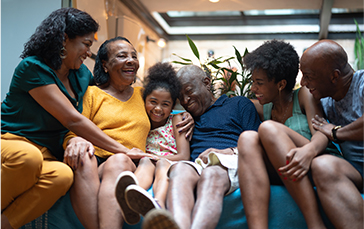San Francisco is committed to ending ageism as part of our work to ensure that all residents can age and thrive in our City. Reframing Aging San Francisco, a partnership between the Department of Aging and Adult Services (DAAS), the Metta Fund, and over 30 community organizations, will build on and strengthen San Francisco’s long history of innovating and working collectively to provide services that enable older adults and people with disabilities to remain engaged and active members of our City.
Ageism Harms Individuals and the Community
We must engage San Franciscans of all ages to overcome age-related biases and negative stereotypes. For individuals, ageism can affect everything from employment, to health outcomes, to longevity. One third of the 30- to 50-year olds we surveyed already reported experiencing some form of ageism. Among older adults, a lifetime of internalized biases about aging makes us less likely to advocate for ourselves and contributes to our reluctance to seek out services that can keep us connected to our communities. For San Francisco as a whole, negative assumptions about aging cause us to overlook the skills and talents that older adults can and do contribute throughout our communities.
Creating Stronger Solutions Together
When policy makers design solutions that recognize the strengths that older adults bring to San Francisco, we make space for more innovative programs and public policy. San Francisco has long been working to advance an age- and disability- inclusive city through a combination of policy planning, coalition-building, and funding for a broad range of services.
Bringing together government agencies and community-based organizations has led to innovative solutions that meet the needs of our diverse neighbors. From senior employment initiatives to intergenerational programs in which older and younger San Franciscans help each other, we are growing new and ingenious approaches that support and empower older adults. In addition to building effective programs, this collaborative approach has made San Francisco a leader in broader aging- and disability-related policies. Current citywide initiatives include the Long Term Care Coordinating Council (started in 2004), the Age- and Disability-Friendly San Francisco initiative (2014), and the Dignity Fund Coalition and funding set-aside for older adults and people with disabilities (2016). With Reframing Aging San Francisco, we are proud to bring together a diverse and enthusiastic partnership to continue this tradition of innovation.
Reframing Aging San Francisco Campaign
Reframing Aging San Francisco aims to increase public awareness of ageism, disrupt negative stereotypes of older adults, and promote connection to supportive services. We’ve drawn on the Frameworks Institute’s research-based recommendations about reframing how we talk about aging issues to craft a local campaign that integrates traditional and social media strategies and leverages government, local non-profit agencies, and other interested stakeholders to maximize impact.
In our survey of 30 to 50-year old City residents, we found that over 70 percent feel ageism is an important issue, and that they came up with more negative than positive words when they think of themselves aging. Awakening San Franciscans to these negative biases and what we can do to address ageism will occur in several phases. Throughout, we are working to incorporate tools and activities to increase impact and foster participation from a wide group of San Franciscans.
From mid-October to early December 2019, there will be a public messaging campaign starring five older San Franciscans. Look for messages about characteristics that “Never Get Old” on light pole and transit advertisements, several billboards, and social media. We invite you to take action, as well as learn more about the five local resident’s creativity, passion, intelligence, leadership, and courage at EndAgeism.com.
During 2020, the initiative will continue reaching out to San Franciscans of all ages and will include opportunities for intergenerational activities. In our survey of 30- to 50-year olds, 43 percent reported that they didn’t have friends or colleagues who are over 60 — yet 83 percent said they’d like to spend more time with older adults. Similarly, our community needs assessment among older adults found many are also looking for opportunities to get to know younger San Franciscans.
We will also continue to engage older adults around our own internalized ageism, and increase awareness of San Francisco resources that enable older adults and people with disabilities to remain active and engaged in community.
